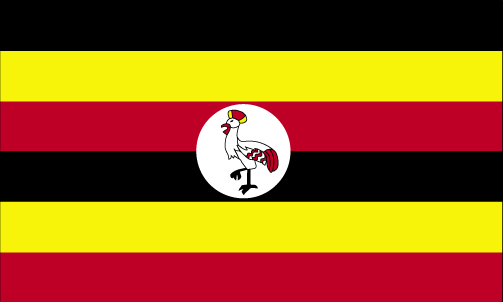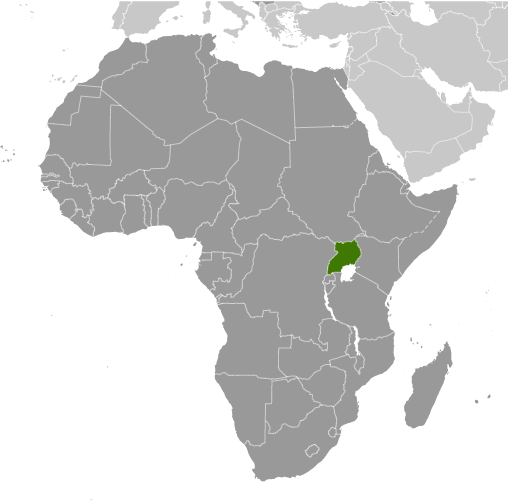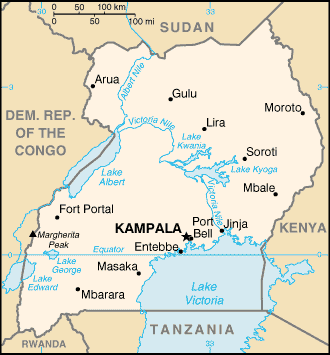The colonial boundaries created by Britain to delimit Uganda grouped together a wide range of ethnic groups with different political systems and cultures. These differences prevented the establishment of a working political community after independence was achieved in 1962. The dictatorial regime of Idi AMIN (1971-79) was responsible for the deaths of some 300,000 opponents; guerrilla war and human rights abuses under Milton OBOTE (1980-85) claimed at least another 100,000 lives. The rule of Yoweri MUSEVENI since 1986 has brought relative stability and economic growth to Uganda. During the 1990s, the government promulgated non-party presidential and legislative elections. In January 2009, Uganda assumed a nonpermanent seat on the UN Security Council for the 2009-10 term.
Population
33,398,682
Country comparison to the world:37
note:estimates for this country explicitly take into account the effects of excess mortality due to AIDS; this can result in lower life expectancy, higher infant mortality, higher death rates, lower population growth rates, and changes in the distribution of population by age and sex than would otherwise be expected (July 2010 est.)
Nationality
Noun:Ugandan(s)
Adjective:Ugandan
Ethnic groups
Baganda 16.9%, Banyakole 9.5%, Basoga 8.4%, Bakiga 6.9%, Iteso 6.4%, Langi 6.1%, Acholi 4.7%, Bagisu 4.6%, Lugbara 4.2%, Bunyoro 2.7%, other 29.6% (2002 census)
Religions
Roman Catholic 41.9%, Protestant 42% (Anglican 35.9%, Pentecostal 4.6%, Seventh Day Adventist 1.5%), Muslim 12.1%, other 3.1%, none 0.9% (2002 census)
Languages
English (official national language, taught in grade schools, used in courts of law and by most newspapers and some radio broadcasts), Ganda or Luganda (most widely used of the Niger-Congo languages, preferred for native language publications in the capital and may be taught in school), other Niger-Congo languages, Nilo-Saharan languages, Swahili, Arabic
Country Name
Conventional long form:Republic of Uganda
Conventional short form:Uganda
Government Type
republic
Capital
Name:Kampala
Geographic coordinates:0 19 N, 32 25 E
Time difference:UTC+3 (8 hours ahead of Washington, DC during Standard Time)
Administrative divisions
80 districts; Abim, Adjumani, Amolatar, Amuria, Amuru, Apac, Arua, Budaka, Bududa, Bugiri, Bukedea, Bukwa, Bulisa, Bundibugyo, Bushenyi, Busia, Butaleja, Dokolo, Gulu, Hoima, Ibanda, Iganga, Isingiro, Jinja, Kaabong, Kabale, Kabarole, Kaberamaido, Kalangala, Kaliro, Kampala, Kamuli, Kamwenge, Kanungu, Kapchorwa, Kasese, Katakwi, Kayunga, Kibale, Kiboga, Kiruhara, Kisoro, Kitgum, Koboko, Kotido, Kumi, Kyenjojo, Lira, Luwero, Lyantonde, Manafwa, Maracha, Masaka, Masindi, Mayuge, Mbale, Mbarara, Mityana, Moroto, Moyo, Mpigi, Mubende, Mukono, Nakapiripirit, Nakaseke, Nakasongola, Namutumba, Nebbi, Ntungamo, Oyam, Pader, Pallisa, Rakai, Rukungiri, Sembabule, Sironko, Soroti, Tororo, Wakiso, Yumbe
Independence
9 October 1962 (from the UK)
National Holiday
Independence Day, 9 October (1962)
Constitution
8 October 1995; amended in 2005
note: the amendments in 2005 removed presidential term limits and legalized a multiparty political system
Legal system
based on English common law and customary law; accepts compulsory ICJ jurisdiction with reservations
Suffrage
18 years of age; universal
Executive branch
Chief of state:President Lt. Gen. Yoweri Kaguta MUSEVENI (since seizing power on 26 January 1986); note - the president is both chief of state and head of government
Head of government:President Lt. Gen. Yoweri Kaguta MUSEVENI (since seizing power on 26 January 1986); Prime Minister Apolo NSIBAMBI (since 5 April 1999); note - the prime minister assists the president in the supervision of the cabinet
Cabinet:Cabinet appointed by the president from among elected legislators
(For more information visit the World Leaders website)
Elections:president reelected by popular vote for a five-year term; election last held on 23 February 2006 (next to be held in February 2011)
Election results:Lt. Gen. Yoweri Kaguta MUSEVENI elected president; percent of vote - Lt. Gen. Yoweri Kaguta MUSEVENI 59.3%, Kizza BESIGYE 37.4%, other 3.3%
Legislative branch
unicameral National Assembly (332 seats; 215 members elected by popular vote, 104 nominated by legally established special interest groups [women 79, army 10, disabled 5, youth 5, labor 5], 13 ex-officio members; members to serve five-year terms)
Elections:last held on 23 February 2006 (next to be held in February 2011)
Election results:percent of vote by party - NA; seats by party - NRM 205, FDC 37, UPC 9, DP 8, CP 1, JEEMA 1, independents 37, other 34
Judicial branch
Court of Appeal (judges are appointed by the president and approved by the legislature); High Court (judges are appointed by the president)
Political Parties and Leaders
Conservative Party or CP [Ken LUKYAMUZI]; Democratic Party or DP [Kizito SSEBAANA]; Forum for Democratic Change or FDC [Kizza BESIGYE]; Justice Forum or JEEMA [Muhammad Kibirige MAYANJA]; National Resistance Movement or NRM [Yoweri MUSEVENI]; Peoples Progressive Party or PPP [Bidandi SSALI]; Ugandan People's Congress or UPC [Miria OBOTE]
note: a national referendum in July 2005 opened the way for Uganda's transition to a multi-party political system
Political pressure groups and leaders
Lord's Resistance Army or LRA [Joseph KONY]; Young Parliamentary Association [Henry BANYENZAKI]; Parliamentary Advocacy Forum or PAFO; National Association of Women Organizations in Uganda or NAWOU [Florence NEKYON]; The Ugandan Coalition for Political Accountability to Women or COPAW
International organization participation
AfDB, AU, C, COMESA, EAC, EADB, FAO, G-77, IAEA, IBRD, ICAO, ICCt, ICRM, IDA, IDB, IFAD, IFC, IFRCS, IGAD, ILO, IMF, Interpol, IOC, IOM, IPU, ISO (correspondent), ITSO, ITU, ITUC, MIGA, NAM, OIC, OPCW, PCA, UN, UN Security Council (temporary), UNAMID, UNCTAD, UNESCO, UNHCR, UNIDO, UNMIS, UNOCI, UNWTO, UPU, WCO, WFTU, WHO, WIPO, WMO, WTO
Diplomatic representation in the US
Chief of mission:Ambassador Perezi Karukubiro KAMUNANWIRE
Chancery:5911 16th Street NW, Washington, DC 20011
Telephone:[1] (202) 726-7100 through 7102, 0416
FAX:[1] (202) 726-1727
Diplomatic representation from the US
Chief of mission:Ambassador Steven BROWNING
Embassy:1577 Ggaba Road, Kampala
Mailing address:P. O. Box 7007, Kampala
Telephone:[256] (414) 259 791 through 93, 95
FAX:[256] (414) 258-794
Flag description
six equal horizontal bands of black (top), yellow, red, black, yellow, and red; a white disk is superimposed at the center and depicts a red-crested crane (the national symbol) facing the hoist side; black symbolizes the African people, yellow sunshine and vitality, red African brotherhood; the crane was the military badge of Ugandan soldiers under the UK










